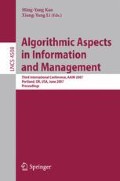Abstract
We introduce and study satisfiability games, a new class of games that can be seen as the non-cooperative version of classical maximum satisfiability problems. We give several results involving these games and mainly focus on their expressiveness. In particular, we show that there exists a strong correspondence between satisfiability games and congestion games. As one of the consequences of our results, we show that each game is isomorphic to a congestion game with player specific payoffs. Thus, each other game can be defined as a particular specialization of congestion games with player specific payoffs and this paper can be considered as a first effort in outlining a classification of non-cooperative games.
Access this chapter
Tax calculation will be finalised at checkout
Purchases are for personal use only
Preview
Unable to display preview. Download preview PDF.
References
Anshelevich, E., Dasgupta, A., Tardos, E., Wexler, T.: Near-Optimal Network Design with Selfish Agents. In: Proceedings of STOC 2003, pp. 511–520. ACM Press, New York (2003)
Chen, X., Deng, X.: Settling the Complexity of 2-Player Nash Equilibrium. In: Proceedings of FOCS 2006, pp. 261–272. IEEE Computer Society Press, Los Alamitos (2006)
Christodoulou, G., Koutsoupias, E., Nanavati, A.: Coordination Mechanisms. In: Díaz, J., Karhumäki, J., Lepistö, A., Sannella, D. (eds.) ICALP 2004. LNCS, vol. 3142, pp. 345–357. Springer, Heidelberg (2004)
Christodoulou, G., Mirrokni, V.S., Sidiropoulos, A.: Convergence and Approximation in Potential Games. In: Durand, B., Thomas, W. (eds.) STACS 2006. LNCS, vol. 3884, pp. 349–360. Springer, Heidelberg (2006)
Daskalakis, K., Goldberg, P.W., Papadimitriou, C.H.: The Complexity of Computing a Nash Equilibrium. In: Proceedings of STOC 2006, pp. 71–78. ACM Press, New York (2006)
Daskalakis, K., Papadimitriou, C.H.: Three-Player Games Are Hard. Technical Report TR05-139, ECCC (2005)
Fabrikant, A., Papadimitriou, C.H., Talwar, K.: The Complexity of Pure Nash Equilibria. In: Proceedings of STOC 2004, pp. 604–612. ACM Press, New York (2004)
Korilis, Y., Lazar, A.: On the Existence of Equilibria in Non-cooperative Optimal Flow Control. Journal of the ACM 42(3), 584–613 (1995)
Koutsoupias, E., Papadimitriou, C.H.: Worst-case Equilibria. In: Meinel, C., Tison, S. (eds.) STACS 1999. LNCS, vol. 1563, pp. 404–413. Springer, Heidelberg (1999)
La, R., Anantharam, V.: Optimal Routing Control: Game Theoretic Approach. In: Proceedings of the 1997 CDC Conference (1997)
Milchtaich, I.: Congestion Games with Player Specific Payoff Functions. Games and Economic Behavior 13, 111–124 (1996)
Mirrokni, V.S.: Approximation Algorithms for Distributed and Selfish Agents. Massachusetts Institute of Technology (June 2005)
Mirrokni, V.S., Vetta, A.: Convergence Issues in Competitive Games. In: Jansen, K., Khanna, S., Rolim, J.D.P., Ron, D. (eds.) RANDOM 2004 and APPROX 2004. LNCS, vol. 3122, pp. 183–194. Springer, Heidelberg (2004)
Monderer, D.: Multipotential Games. In: Proceedings of IJCAI, to appear (2007)
Monderer, D., Shapley, L.S.: Potential Games. Games and Economic Behavior 14, 124–143 (1996)
Nash, J.: Equilibrium Points in n-person Games. Proceedings of the National Academy of Sciences 36, 48–49 (1950)
Nash, J.: Non-cooperative Games. Annals of Mathematics 54(2), 286–295 (1951)
Rosenthal, R.W.: A Class of Games Possessing Pure-Strategy Nash Equilibria. International Journal of Game Theory 2, 65–67 (1973)
Shenker, S.J.: Making Greed Work in Networks: a Game-Theoretic Analysis of Switch Service Disciplines. IEEE/ACM Transactions on Networking 3(6), 819–831 (1995)
Author information
Authors and Affiliations
Editor information
Rights and permissions
Copyright information
© 2007 Springer Berlin Heidelberg
About this paper
Cite this paper
Bilò, V. (2007). On Satisfiability Games and the Power of Congestion Games. In: Kao, MY., Li, XY. (eds) Algorithmic Aspects in Information and Management. AAIM 2007. Lecture Notes in Computer Science, vol 4508. Springer, Berlin, Heidelberg. https://doi.org/10.1007/978-3-540-72870-2_22
Download citation
DOI: https://doi.org/10.1007/978-3-540-72870-2_22
Publisher Name: Springer, Berlin, Heidelberg
Print ISBN: 978-3-540-72868-9
Online ISBN: 978-3-540-72870-2
eBook Packages: Computer ScienceComputer Science (R0)

